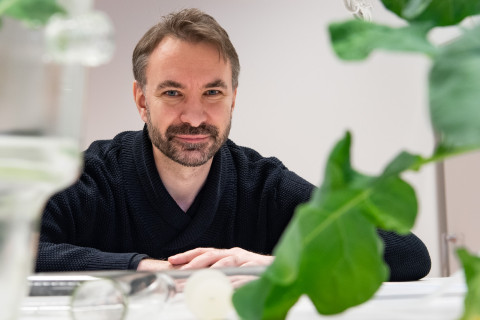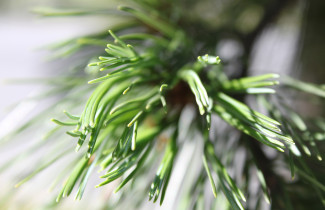Professor of Chemical Ecology James Blande and his research group at the University of Eastern Finland focus on plant stress responses and plant-to-plant interactions.
A thick book filled with science, Plant Behavior and Intelligence, lies on Professor James Blande’s desk, allowing one’s imagination to soar. Blande has a long history of studying plant behaviour and plants’ chemical interactions with their surrounding environment, but do plants actually have intelligence? The professor’s understanding smile reveals that this is not the first time someone’s asked this question.
“I wouldn’t use the word intelligence when it comes to plants. True, plants are very lively and capable of complex communication, but I’d rather talk about behaviour than intelligence,” Blande says.
James Blande has been working as Professor of Chemical Ecology at the University of Eastern Finland’s Department of Environmental and Biological Sciences since 2022, and I interview him in his office on the Kuopio Campus, which Blande has grown very familiar with after all his years in Finland. Originally from the UK, he first arrived in Kuopio – in the very same building – as a postdoctoral researcher in 2005.
Compared to global metropolises, the University of Eastern Finland’s location is favourable for environmental research, as it is easier to study the impact of pollutants on plants in a clean Finnish environment than in a more polluted big city.
Research, nevertheless, takes place in international networks, and Blande’s Environmental Ecology Research Group currently hosts scientists from ten different countries. According to Blande, the advantages of the University of Eastern Finland for a researcher can be crystallised into three things: internationality, interdisciplinarity and innovativeness.
“There are many advantages to doing research at the University of Eastern Finland. Our community at the Department of Environmental and Biological Sciences is very diverse and being interdisciplinary allows us to do very innovative research. That’s also the direction chosen in the university’s strategy. Our research group is part of the Climate Forcing, Ecosystems and Health research community, CLEHE, which has great potential for interdisciplinary research. That’s a huge advantage here,” Blande emphasises.
Interest in nature and animals led to a career in research
With his roots in London, James Blande maintains a strong identity of a Londoner, but these days prefers to be closer to the natural environment. Growing up in a big city didn’t involve everyday contact with nature, but the Blande family garden did offer ample opportunities for getting to know plants and insects, butterflies and hedgehogs.
“I knew I wanted to study science ever since I was 14 years old, and I took chemistry, biology and mathematics as my optional subjects. Initially, I wanted to become a vet because of my love for nature and animals. However, my goals changed as I got more interested in biology.”
Blande completed his undergraduate degree in applied biology at the University of Bath. His studies included field research at various research stations: in Dorset, southern England, he studied the behaviour of geese and the movement of shellfish, and at Rothamsted Research, he focused on the chemical signals used by aphids in their communication. At Rothamsted, which is affiliated with the University of Southampton, he was recommended to pursue a PhD.
“I wrote my PhD on the chemical ecology of aphid parasitoids. I was lucky to be assigned with excellent thesis supervisors, Professor Guy Poppy and Professor John Pickett,” Blande says.
He defended his PhD at the University of Southampton in 2004 and then applied for a postdoc in a Marie Curie funded research network operating across eight European countries. In Finland, the project was led by Professor Jarmo Holopainen at the University of Kuopio, and Blande joined Holopainen’s group.
“Professor Holopainen was a pioneer of research investigating the effects of ozone pollution on plant-insect interactions mediated by volatile plant chemicals. This led me to another key career moment when I was appointed an Academy Research Fellow in 2011. This gave me the opportunity to investigate the fascinating world of how plants interact with each other through the emission of volatile chemicals, and particularly the effects of ozone pollution on those interactions.”
Following his Academy Research Fellow period, Blande was appointed as Associate Professor in 2018, and soon after as the leader of the Environmental Ecology Research Group, at the University of Eastern Finland.
To me, it is very important that my research be linked to global issues.
James Blande
Professor

Latest research explores conifer communication
In his role as a professor, Blande’s time is divided between doing research on chemical ecology, leading his own research group, and supervising PhD students.
A recent study by Blande’s group focused on insect-induced chemical signals that conifers use to communicate with one another. The study attracted widespread international attention. Funded by the Academy of Finland, the four-year Conifercom project explores conifer communication more broadly. The project is a collaboration between European, Chinese and American partners.
Blande conducts his research both out in the field and in the office. When Blande first arrived in Kuopio, he particularly enjoyed field work by the botanical garden near the campus.
“Nowadays, we do field research in different parts of the world and with several partners. For example, we are studying plant stress in Suonenjoki together with the Natural Resources Institute Finland, and we have also carried out research at Kevo research station in northern Finland. We are also closely networked with research partners in the US, China and the UK, for example. In California, for instance, we are conducting field research to study plant communication,” Blande explains.
One of the international centres for chemical ecology research is located at Max Planck Institute, which also hosts the Max Planck Centre on next Generation Insect Chemical Ecology, nGICE, where James Blande is an external advisor. The centre trains junior researchers and its research focus is on the impact of climate change and pollution on the interaction between plants and insects.
Although plants and insects may be tiny in size, the scale of research addressing them is global when it comes to climate change and environmental pollution.
“To me, it is very important that my research be linked to global issues. Even if research into plant behaviour and plant-to-plant interaction doesn’t always have immediate practical applications, it is directly linked to major issues such as climate change, ecosystem health and food security,” Blande points out.



